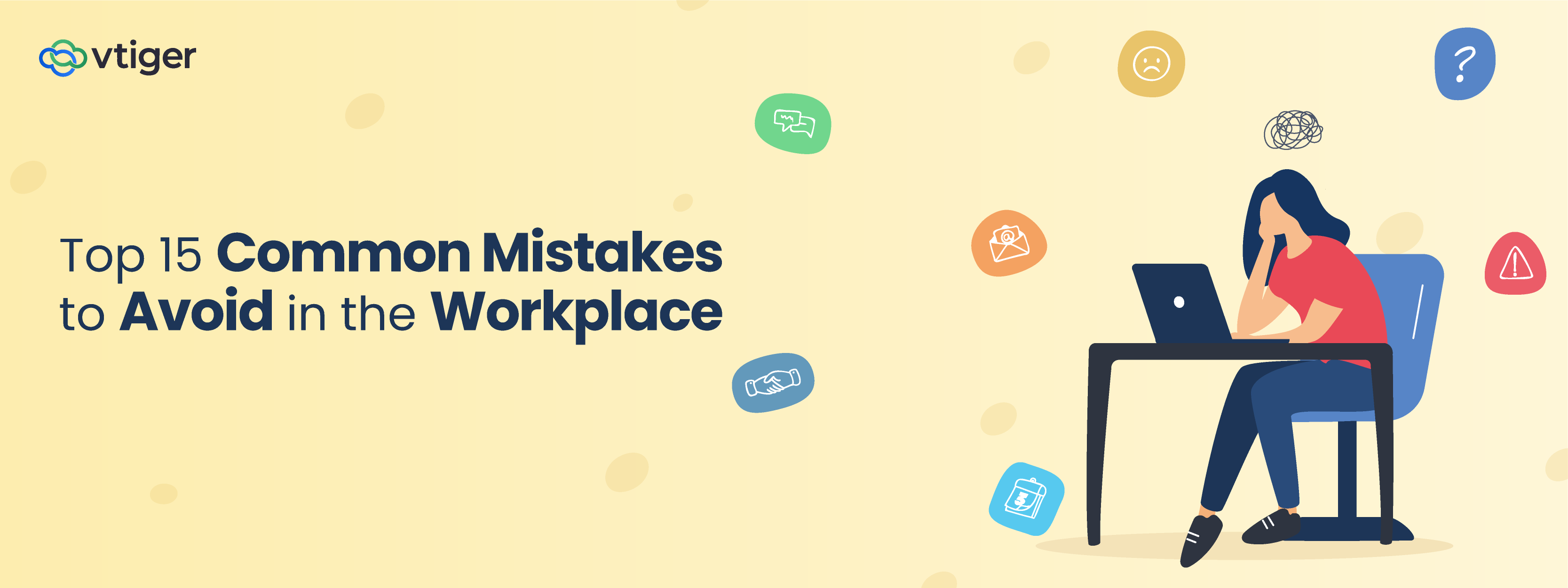Mistakes happen everywhere and to everyone, even in the workplace. No matter your experience, you will inevitably make a mistake or two. . Even though some workplace mistakes may not appear serious, there is a chance they will negatively affect your professionalism and work ethic.
Here are ten typical workplace mistakes and how you can avoid them.
Overworking
We all want to stand out, establish ourselves, and demonstrate that we deserve the promotion based on our abilities. We might take on a few extra tasks or make promises we can’t keep to gain attention. However, demonstrating your worth is not the same as working excessively.
The amount of work you put in isn’t always a direct correlation to your value as an employee. It is actually the caliber of the work itself. Stress, attention problems, a general drop in the caliber of your work, and ultimately burnout can result from overworking.
Underworking
Like overworking, underworking is a common workplace error that can be problematic for obvious reasons.
You are working while on paid company time as an employee. In addition to wasting company resources and impeding your coworkers’ ability to depend on you to do your part, working too little or with little regard for the quality of your work also gives you an unprofessional reputation as someone who is unmotivated or uninterested in doing a good job.
Skill Stagnation
Work wiser rather than harder. It’s a frequently made statement that holds true in the workplace.
Everyone has their strengths and weaknesses, but failing to work on your weaknesses or enhance your strengths is a mistake people frequently make at work and is not a good or constructive way to think. Instead, make an effort to analyze your work, learn its details, identify the essential skills, and hone those skills to make the workflow easier for you and others.
Your daily tasks will be simpler and you’ll accomplish more by the end of the day if you increase your efficiency.
Missing Deadlines
Timelines are important. Even though some deadlines might be more pressing than others, it is ultimately your responsibility to meet them. Missing deadlines will reflect poorly on you and make people believe that you are unreliable, uninterested in your work, or unmotivated in your position.
Try to organize your tasks throughout the day with the aid of to-do lists or sticky notes, and prioritize important or urgent tasks and projects to avoid making these errors at work. To-do list apps are a good alternative because you can set your reminders to ensure that you are always informed at the appropriate time. Always remember that it’s a good idea to get started as early as possible in order to give yourself enough time to finish on time comfortably.
Reach out to your manager or supervisor if you fear missing a deadline, explain the circumstance, and kindly request a little more time. Although this is not always possible, it is a good general rule to abide by.
Disorganization
Whatever your line of work, being properly organized is crucial to your ability to perform well.
A scattershot daily or weekly schedule can result in ineffective work and missed deadlines. Similarly, if your desktop or workstation is disorganized, you won’t know where important documents or tools are, which could be dangerous depending on your line of business.
Simply try to make notes of what needs to be done, organize your tools and files in a way that works for you, and purge your desk or station of anything that is not necessary for your work to avoid making this mistake.
Not communicating
According to the National Association of IT Professionals, poor communication contributes to 28% of project failures.
How will your team members know what needs to be done if you don’t communicate with them? How will you decide who does what if you and your coworkers are working on a project together? They cannot read minds. Furthermore, you lack telepathy, :).
To get everyone on the same page, decide on a time for weekly meetings. Ensure you share tasks, updates, and schedules to lessen confusion. Your boss will appreciate your initiative.
Not prepping for meetings
Being unprepared is not only snobbish but also demonstrates extreme disdain for your position, your superiors, and coworkers. Goodbye, raise, and promotion.
Know everything there is to know about meeting requirements. Prepare for questions, comments, and inquiries so you can respond immediately.
Not smiling
Who said it’s overrated to smile? Pryce-Jones, who formed the first mail-order business, says that those who are cheerful and smiling at work spend 80% of their time doing things related to their jobs, compared to those who are unhappy and complain 40% of the time. And even if you don’t feel like smiling, there is proof that you will be happier if you do. Win-win!
Following are the benefits of smiling at work:
- A sincere smile not only conveys that you are upbeat and optimistic, but it can also lift the spirits of those around you. And when people are happy, productivity increases.
- When you are managing others, a smile can go a long way. Smiling makes your staff feel comfortable and fosters a positive work environment, which can improve company culture.
- A sincere smile is one of the characteristics of someone self-assured. A sincere smile demonstrates your friendliness and reliability.
Not writing it down
Ideas often strike at the worst possible times, making it likely that you won’t remember them later.
Spend some time every day thinking of ideas and then jot them down. Always have a notebook on hand, and jot down any ideas that occur to you. You will the advantage over the other Nagging Nancy in the cubicle if you lack creativity. Not only will you have written a wealth journal, but you’ll also have built one of your body’s strongest muscles—the one that will take you to the top of the corporate ladder.
Here is why you should take notes at work:
- You will save time and energy: By taking notes, the person saves significant time and energy. It uses the existing energy and time to repeat the information instead of remembering it.
- It will reduce your anxiety: Another important benefit of taking notes is anxiety reduction. One thinks less about the possibility that one can forget something. Besides, knowledge and opinion are more dominant. Hence they trust themselves more because they think about these issues. So, taking notes will increase your self-confidence while reducing your anxiety.
- You will actively participate: There is also a contribution when taking notes takes place as much as the contribution of the idea and knowledge process. A person is more alert and cautious when taking notes. Thus, the learning and perception skills are higher.
- You will work effectively on your ideas: When you work by taking notes, the frame you need to think about is quite clear. Your creativity is at the top because you have not missed anything and it will not be lost in your thoughts. You will see all the positive and negative aspects in the clearest way.
- No idea will be lost: Ideas that are not noted will not be realized and information that is not noted is condemned to be forgotten. When you take notes and you reduce all risks to a minimum. You will memorize these notes while you are writing and reading. Since your brain and muscle memory work together, your ideas will certainly not disappear.
Not dressing for the part
Do you desire success? Make them believe you are one already by dressing for the part. Increase the level of your office’s style in whatever way you can. Even Neil Patel, New York Times Bestselling author and Entrepreneur, mentions how his profits increased by donning a specific watch. It’s crucial to dress for the role you want to play. Period.
Invest in a wardrobe that will boost your worth. Can’t invest in a wardrobe right now, ensure your clothes are clean and pressed.
Rambling
Once you’ve finished speaking, stop. At best, rambling makes you appear unprofessional. Worst case? You appear to be a liar.
To show your superiors that you mean business, stay on topic at all times.
Powering through
Only one in five Americans got up from their desks for lunch in 2012. However, working through a break reduces productivity and concentration. Breaks give your brain the necessary time to rest and recharge, which cannot be compromised (especially in creative jobs).
If you’re in the zone, make some memory-stimulating notes so you can pick up right where you left off when you return, with the momentum gained rather than lost.
Multi-tasking too much
Working on too many projects at once results in little to no progress and a loss of focus on your true priorities. Employers seek candidates who can set priorities and meet deadlines. You shouldn’t check your phone or answer emails while in a meeting. You ought to listen to what everyone else is saying and, as necessary, offer your insight and opinions.
Not learning from your mistakes
Only if you learn from your mistakes can mistakes be very valuable. If you ignore them, you might repeatedly make the same errors. You can demonstrate your leadership potential to a greater extent the more you can learn from your mistakes and better yourself.
For the new employees
At last, we have five mistakes a new employee should avoid in the workplace.
- Ignoring office culture & protocol
- Taking on too much work or not at all
- Having poor social or personal habits
- Praising or criticizing a former employer
- Being too silent or a know-it-all



